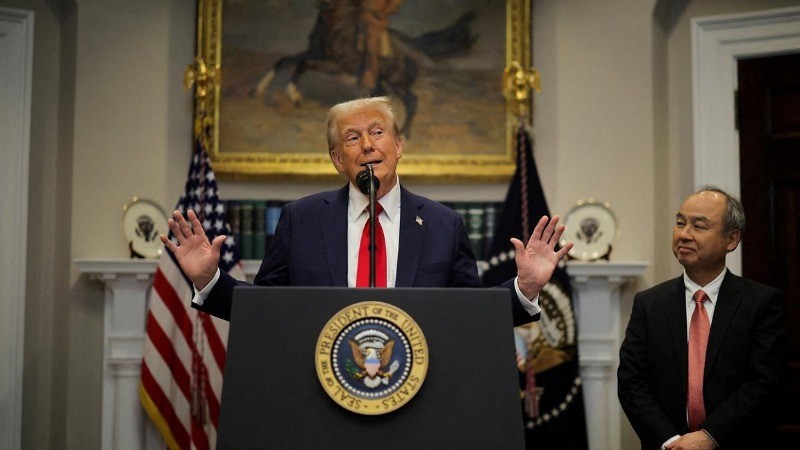
WASHINGTON: Oil prices took a dip on Friday after U.S. President Donald Trump linked high inflation to the rising global oil prices during a video address at the World Economic Forum in Davos, Switzerland.
Trump shared his plans to tackle this issue by increasing domestic oil production and urging "Saudi Arabia and OPEC to lower the cost of oil."
"You have to bring the prices down, and honestly, I'm surprised they did not do it before the election," Trump commented. "It did not show much support that they didn’t do it.
Brent crude futures dropped by 50 cents, falling to USD77.95 a barrel at 00:44 GMT on Friday, as reported by Reuters. Meanwhile, U.S. West Texas Intermediate crude lost 31 cents, settling at USD74.31 a barrel.
At their most recent meeting in December, OPEC+, which includes Saudi Arabia, the UAE, Kuwait, and nine other countries, decided to extend current production cuts for several more months in an effort to stabilize prices that have remained below certain members' break-even levels, including Saudi Arabia's.
In his speech, Trump also suggested that OPEC's intervention in lowering oil prices could "immediately" end the ongoing war between Russia and Ukraine.
"They should have done it a long time ago," he added. "They are, in a way, responsible for the current situation -- millions of lives are being lost."
The U.S. Federal Reserve’s Federal Open Market Committee (FOMC) is responsible for setting interest rates, which affect markets globally, and typically works independently from political influence.
While addressing global bankers, government officials, and CEOs at Davos, Trump also referred to reports suggesting that Saudi Crown Prince Mohammed bin Salman had pledged USD600 billion in U.S. investments over the next four years during a recent call between the two leaders.
"I will be asking the crown prince, who is a great person, to bring that total to around USD1 trillion," Trump said on Thursday.
"I believe they will do that because we’ve been very supportive of them."
Earlier on Thursday, Saudi Arabia's finance minister, Mohammed Al-Jadaan, defended the Crown Prince's USD600 billion investment promise, calling it "not something new" and adding that Saudi Arabia had already invested more than USD770 billion into the U.S. economy.
"This includes both investments and procurements," he told Bloomberg at the World Economic Forum. "We have ambitious plans in Saudi Arabia. Saudi Vision 2030 is progressing as planned, and our relationships with the U.S., Europe, and China will continue to thrive."
Trump’s second term was built on an "America First" platform, which included calls for higher tariffs on imports and concerns over international trade wars. U.S.-Saudi trade reached USD46.6 illion in 2022.
When asked about concerns regarding a potential second Trump presidency, Al-Jadaan said, "We are optimistic about the U.S. economy. We believe the next few years will be strong for the U.S. economy, and that will benefit the global market."
This week, Aramco's CEO, Amin Nasser, stated that he believes the oil market remains healthy and expects a further 1.3 million barrels per day of demand this year.
The state-backed oil giant also bought its first shipment of WTI Midland, a U.S. crude oil type that supports the global Brent benchmark.
According to Fitch Ratings, Saudi Arabia requires oil prices to exceed USD90 per barrel to balance its budget, while the International Monetary Fund (IMF) estimates the figure to be USD80.
Saudi Arabia is investing billions into a range of large-scale development projects as part of its Vision 2030 plan to diversify its economy away from oil. To fund these projects, the country has increased borrowing.
Al-Jadaan reassured critics that Saudi Arabia’s substantial spending commitments would not overstretch its resources. "We know exactly where we are going to spend, how we will fund it, and how it will benefit the economy without crowding out the private sector," he explained.